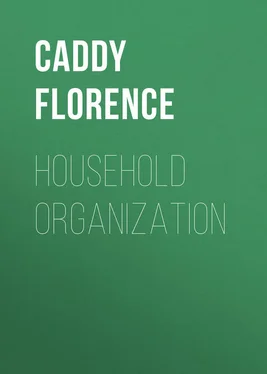Florence Caddy - Household Organization
Здесь есть возможность читать онлайн «Florence Caddy - Household Organization» — ознакомительный отрывок электронной книги совершенно бесплатно, а после прочтения отрывка купить полную версию. В некоторых случаях можно слушать аудио, скачать через торрент в формате fb2 и присутствует краткое содержание. ISBN: , Жанр: foreign_antique, foreign_prose, на английском языке. Описание произведения, (предисловие) а так же отзывы посетителей доступны на портале библиотеки ЛибКат.
- Название:Household Organization
- Автор:
- Жанр:
- Год:неизвестен
- ISBN:http://www.gutenberg.org/ebooks/34097
- Рейтинг книги:5 / 5. Голосов: 1
-
Избранное:Добавить в избранное
- Отзывы:
-
Ваша оценка:
- 100
- 1
- 2
- 3
- 4
- 5
Household Organization: краткое содержание, описание и аннотация
Предлагаем к чтению аннотацию, описание, краткое содержание или предисловие (зависит от того, что написал сам автор книги «Household Organization»). Если вы не нашли необходимую информацию о книге — напишите в комментариях, мы постараемся отыскать её.
Household Organization — читать онлайн ознакомительный отрывок
Ниже представлен текст книги, разбитый по страницам. Система сохранения места последней прочитанной страницы, позволяет с удобством читать онлайн бесплатно книгу «Household Organization», без необходимости каждый раз заново искать на чём Вы остановились. Поставьте закладку, и сможете в любой момент перейти на страницу, на которой закончили чтение.
Интервал:
Закладка:
"Martha was cumbered about," not with serving, but with too much serving. Doubtless, in the fulness of her hospitality, she tried to do too much, and so she showed irritability. Our Lord's teaching is always that there are good things prepared for us, which we cannot attain if we are over-careful and troubled about provision for the body.
There are roses in life for those who look for roses, if they will but give themselves time to gather them.
We may study with instruction and profit to ourselves the daily habits of foreign nations, and see where they fail, and also wherein they excel us.
M. Taine has put into words an observation which must have occurred to all of us who have travelled, how that "from England to France, and from France to Italy, wants and preparations go on diminishing. Life is more simple, and, if I may say so, more naked, more given up to chance, less encumbered with incommodious commodities."
From Italy we may go on to Arabia, and there see how little is used to keep the body in health. A woollen garment, warm enough to sleep in the open air (we cannot say out of doors where there are no doors), and thick enough to keep off the scorching rays of the sun by day, and a thin shawl for the head, is all their clothing; and the simplest meal once a day seems to be enough to keep them strong and active. Arabs have walked or run by my horse during whole days in the heat of the sun, and lived upon air until sundown, when they seemed to eat nothing but a little parched corn before stretching themselves down to sleep. It is not customary, even among the upper classes in Southern Europe and in the East, to eat more than two meals a day.
Liebig tells us of the nutrition of plants from the atmosphere: we may go further, and proclaim the nutrition of man from the atmosphere. On the moorland, on the mountain side, at sea, and in the desert, I have over and over again felt its feeding properties; and we know that although we are, in such circumstances, hungry for our meals, we are not at all exhausted, nor do we want to feed frequently.
As the leaves of a plant absorb the carbon in the air and give back the oxygen, so do we feed upon the oxygen and return the nitrogen. But we must have the oxygen. By our own present system of frequent heavy meals we throw all the hard work done by our bodies entirely upon the digestive organs, and when these are exhausted with their efforts, we feel faint, and mistakenly ply them with stimulants and concentrated nourishment, until at last they break down under their load.
But leaving the Arabs, who are types of a high race in a natural (uneducated) condition, may we not learn much from more civilized nations?
Besides taking example by the early hours of the Germans, we may imitate their industry, and, in our studies, their thoroughness and diligence of research.
From the bright, elastic French people we may (we women especially) copy their cheerfulness, frugality, and their keen, clear-headed habits of business. See how diligent they are at accounts, how quick at estimates, in ways and means; how they sharpen their wit, until it shines and makes their society sought as we in England seek a clever book. The Frenchwoman works the machinery of her own house, goes into the market and fixes the market-price of what she decides upon as suitable to her purposes (she always has a purpose, this Frenchwoman); she dresses herself and her children with taste, and she glitters in society.
From the Spaniards we may learn, by the warning of a proud race, what it is to sink into the scorn of other countries through smoking and debt.
From the Dutch we may learn cleanliness, from the Swiss simplicity, and from the Italians to foster our patriotism. Our American cousins are part of our own family; they only differ from us in having carried our virtues and some of our follies into the superlative.
We should endeavour to be natural in all our doings: to be ourselves, and not always acting a part, and that generally the part of a person of rank, or a millionaire. Let whatever we do be openly done, though not obtrusively nor boastfully; and this whether it is ornamental or only useful. To be truly ornamental it must combine utility. Is not the flower as useful as the leaf?
As an example of what I mean, I will give two opposite instances. A young lady was making the bodice of a dress when a visitor called; she quickly pushed the work under a sofa pillow, and caught up a gold-braided smoking-cap, half worked at the shop, which had lasted a long time as a piece of show-needlework.
The other case is that of a lady who set up for an example to her sex, and always displayed, as a manifestation of superiority, a basket full of gentlemen's stockings, which she seemed to be ever mending. Both of these ladies were acting a part.
Good taste has no false shame; so we need not add the vexations of concealment to the accumulation of cares we have heaped upon our houses, till they are so encumbered with impedimenta of all kinds that our whole strength is taken to keep them in order, and the household machine has to move through such a mass of difficulties that it is like a loaded carriage lumbering through a Turkish road. Why should we add these things to life?
We are daily bringing mechanism to greater perfection, and it is our own fault that we do not make it perform for our houses what Manchester has made it do for our looms, and render ourselves mistresses in reality, instead of merely in name, of our own households.
If we had to go back to the old flint-and-tinderbox days, when it was an hour's hard work in the dark to strike a light, when gas was unknown, when water was not laid on, when all bread must be made at home, all stockings knitted; when there was no such thing as a ready made shirt, much less gowns and polonaises; no perambulators, nor washing machines; – we should not heap upon ourselves superfluous work in the thoughtless way we do at present, and then leave all to the attention of the most careless and irresponsible members of the community.
In a small family there is less work to be done; in a large one there are more hands to do the work, and many hands make light labour.
We would have no mistress of a family a household drudge, while her daughters lounge over fancy-work or a novel; but we would ease her hands, and uphold her in her true position of administratrix, mainspring, guiding star of the home.
Modern educational pressure causes too many of us to indulge our children, and release them from every personal duty. They must have time and quiet for their studies, and so they are allowed to become selfish, and to think that everything must give way to their mental improvement. Whereas we should train them to give as little trouble as possible; and by good management, or by sacrifices, such as getting up earlier, to do at least the extra work appertaining to their individual enjoyment. Why should they, for instance, require hot water brought to their rooms several times a day? Their grandparents used cold, and it was better for them. Why must girls have their hair brushed and braided for them? Why must their lost gloves be found for them, and their wardrobes tidily arranged for them to throw into confusion in their hurry?
Boys, especially, are so seldom trained to habits of consideration, that a young man in a house gives at least twice the trouble that his father does. Boys ring bells with intense heedlessness of its being some one's journey – oftener four journeys – to answer them. They make their boots unnecessarily dirty, and their other clothes also; while the extra baths on football days, and the cleansing of the white garments, make many mothers wish the noble game were not so popular; and to sweep up the dirt the boys bring into a house often constitutes the chief work of a housemaid. We do not expect boys to mend their clothes, but they should be made to put them away, and to keep their books, papers, and toys in their proper places, and to take care of their own pets.
Читать дальшеИнтервал:
Закладка:
Похожие книги на «Household Organization»
Представляем Вашему вниманию похожие книги на «Household Organization» списком для выбора. Мы отобрали схожую по названию и смыслу литературу в надежде предоставить читателям больше вариантов отыскать новые, интересные, ещё непрочитанные произведения.
Обсуждение, отзывы о книге «Household Organization» и просто собственные мнения читателей. Оставьте ваши комментарии, напишите, что Вы думаете о произведении, его смысле или главных героях. Укажите что конкретно понравилось, а что нет, и почему Вы так считаете.












